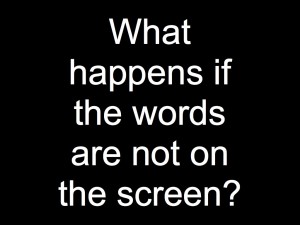 Some TV news anchors become immortalized on YouTube for their on-air blunders. These bloopers often happen when something unexpected occurs and the newscaster doesn?t know what to do next.
Some TV news anchors become immortalized on YouTube for their on-air blunders. These bloopers often happen when something unexpected occurs and the newscaster doesn?t know what to do next.
Looking back, I was fortunate that my television career ended before YouTube was created. Today?s newsrooms know that a funny mistake or blunder will likely be shared globally. That?s somewhat embarrassing and possibly career damaging.
Some of these, like an attack of the giggles or a twisted tongue, can?t be prevented. But all of the following challenges can be overcome with one simple thing:
The Computer Crashes
The teleprompter displays the scripts for the anchors to read. It?s a computer based system, so there?s always a chance that it could freeze up. As you know, rebooting can take longer than you expect, especially when you need it to happen quickly.
If you?re the news anchor, you need to have something to say while this process is taking place. It?s not as easy as you think when you have the pressure of being on live TV.
The Scripts Are Wrong
Sometimes the wrong newscast is accidentally loaded into the teleprompter. This mistake may not be noticed until you realize that you?re reading the 5 p.m. newscast at 6 p.m. and the stories are not the same.
Something Changes
From a breaking news story being added to a live remote report crashing, a 30 minute newscast is a constantly changing performance.
How can one thing help news anchors Clear the Path of all of these situations?
It?s called a printed script. For decades, at the end of newscasts, you see the anchors playing with their scripts. Did you ever wonder why they have printed scripts when they also have a teleprompter?
The script is to a news anchor what a backup parachute is to a sky diver.
Even if they never use it, smart news anchors flip through the pages of their script, keeping up with the teleprompter. This way, if the projected words disappear, then the anchor still has something to say. If a story is dropped, those pages can be removed. And if the producer tells you some important new information, you have a place to write it down.
Smart anchors, no matter their years of experience, always follow along with a script. It?s about preparing yourself for a possible challenge. You can?t prevent these problems but you can be ready for them when they occur.
On the other hand, when you hear an anchor start to babble or look down a lot, it is a sure sign that the newscaster has lost the teleprompter and did not use or follow along with a paper script. Which person do you want reading the news to you?
What variables can you control on the job and have you stopped being ready for the unexpected? The world may not see your mistakes but do you want others to see you like a deer in the headlights, looking unprepared?
Bonus: As today is Martin Luther King Jr. Day, you might enjoy this previous post about how MLK is remembered, by one man, through the camera lens.





